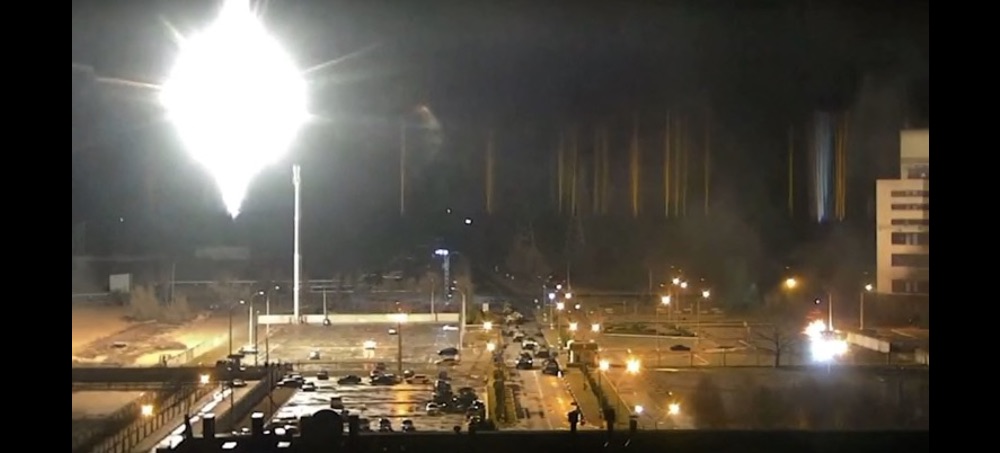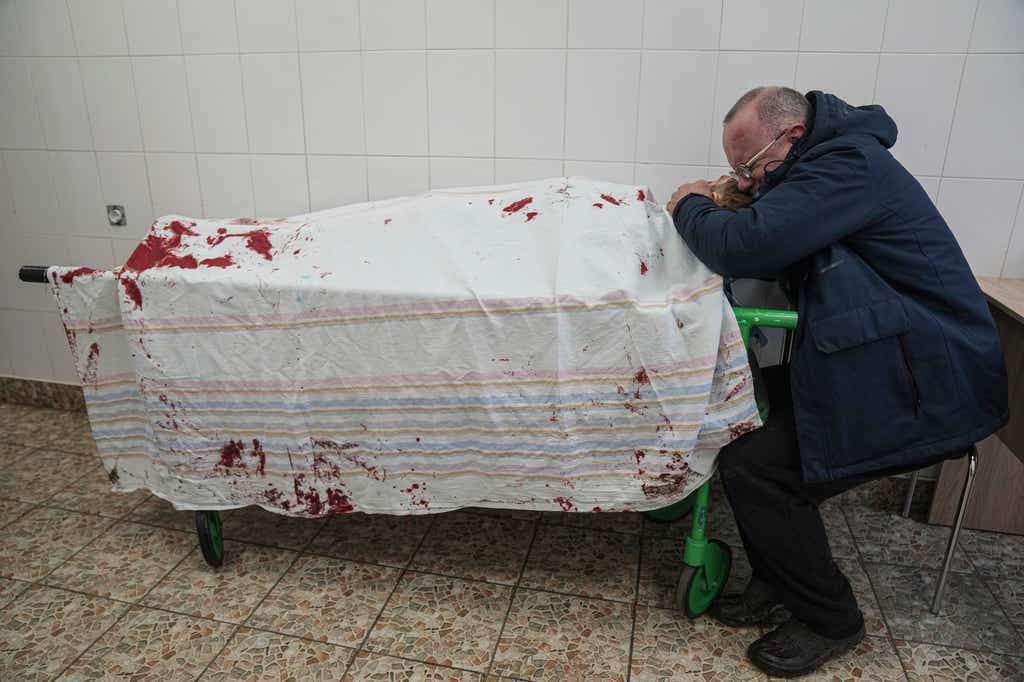Live on the homepage now!
Reader Supported News
ALSO SEE: Ukraine: Russian Attack on Nuclear Power Plant
Condemned by World Leaders
Leading nuclear authorities were concerned — but not panicked — about the damage to the power station. The assault triggered phone calls between Ukrainian President Volodymyr Zelenskyy and U.S. President Joe Biden and other world leaders. The U.S. Department of Energy activated its nuclear incident response team as a precaution.
The attack on the eastern city of Enerhodar and its Zaporizhzhia nuclear plant unfolded as the invasion entered its second week and another round of talks between the two sides yielded a tentative agreement to set up safe corridors to evacuate citizens and deliver humanitarian aid.
Nuclear plant spokesman Andriy Tuz told Ukrainian television that shells were falling directly on the facility and had set fire to one of its six reactors. That reactor is under renovation and not operating, but there is nuclear fuel inside, he said.
Firefighters cannot get near the flames because they are being shot at, he said, and Ukrainian Foreign Minister Dmytro Kuleba tweeted a plea to the Russians to stop the assault and allow fire teams inside.
“We demand that they stop the heavy weapons fire,” Tuz said in a video statement. “There is a real threat of nuclear danger in the biggest atomic energy station in Europe.”
The assault renewed fears that the invasion could damage one of Ukraine’s 15 nuclear reactors and set off another emergency like the 1986 Chernobyl accident, the world’s worst nuclear disaster, which happened about 110 kilometers (65 miles) north of the capital.
U.S. Energy Secretary Jennifer Granholm tweeted that the Zaporizhzhia plant’s reactors were protected by robust containment structures and were being safely shut down.
In an emotional speech in the middle of the night, Zelenskyy said he feared an explosion that would be “the end for everyone. The end for Europe. The evacuation of Europe.”
“Only urgent action by Europe can stop the Russian troops,” he said. “Do not allow the death of Europe from a catastrophe at a nuclear power station.”
But most experts saw nothing to indicate an impending disaster.
The International Atomic Energy Agency said the fire had not affected essential equipment and that Ukraine’s nuclear regulator reported no change in radiation levels. The American Nuclear Society concurred, saying that the latest radiation levels remained within natural background levels.
“The real threat to Ukrainian lives continues to be the violent invasion and bombing of their country,” the group said in a statement.
Jon Wolfsthal, who served during the Obama administration as the senior director for arms control and nonproliferation at the National Security Council, said the plant’s reactors have thick concrete containment domes that should protect them from tank and artillery fire.
But he too was concerned about a potential loss of power at the plant, which could imperil its ability to keep the nuclear fuel cool.
The mayor of Enerhodar said earlier that Ukrainian forces were battling Russian troops on the city’s outskirts. Video showed flames and black smoke rising above the city of more than 50,000, with people streaming past wrecked cars.
Prior to the shelling, the Ukrainian state atomic energy company reported that a Russian military column was heading toward the nuclear plant. Loud shots and rocket fire were heard late Thursday.
“Many young men in athletic clothes and armed with Kalashnikovs have come into the city. They are breaking down doors and trying to get into the apartments of local residents,” the statement from Energoatom said.
Later, a livestreamed security camera linked from the homepage of the Zaporizhzhia plant showed what appeared to be armored vehicles rolling into the facility’s parking lot and shining spotlights on the building where the camera was mounted.
Then there were what appeared to be muzzle flashes from vehicles, followed by nearly simultaneous explosions in surrounding buildings. Smoke rose into the frame and drifted away.
Ukrainian Prime Minister Denys Shmyhal called on the West to close the skies over the country’s nuclear plants. “It is a question of the security of the whole world!” he said in a statement.
The U.S. and NATO allies have ruled out creating a no-fly zone since the move would pit Russian and Western military forces against each other.
Vladimir Putin’s forces have brought their superior firepower to bear over the past few days, launching hundreds of missiles and artillery attacks on cities and other sites around the country and making significant gains in the south.
The Russians announced the capture of the southern city of Kherson, a vital Black Sea port of 280,000, and local Ukrainian officials confirmed the takeover of the government headquarters there, making it the first major city to fall since the invasion began a week ago.
Heavy fighting continued on the outskirts of another strategic port, Mariupol, on the Azov Sea. The battles have knocked out the city’s electricity, heat and water systems, as well as most phone service, officials said. Food deliveries to the city were also cut.
Associated Press video from the port city showed the assault lighting up the darkening sky above deserted streets and medical teams treating civilians, including a 16-year-old boy inside a clinic who could not be saved. The child was playing soccer when he was wounded in the shelling, according to his father, who cradled the boy’s head on the gurney and cried.
Severing Ukraine’s access to the Black and Azov seas would deal a crippling blow to its economy and allow Russia to build a land corridor to Crimea, seized by Moscow in 2014.
Overall, the outnumbered, outgunned Ukrainians have put up stiff resistance, staving off the swift victory that Russia appeared to have expected. But a senior U.S. defense official, speaking on condition of anonymity, said Russia’s seizure of Crimea gave it a logistical advantage in that part of the country, with shorter supply lines that smoothed the offensive there.
Ukrainian leaders called on the people to defend their homeland by cutting down trees, erecting barricades in the cities and attacking enemy columns from the rear. In recent days, authorities have issued weapons to civilians and taught them how to make Molotov cocktails.
“Total resistance. ... This is our Ukrainian trump card, and this is what we can do best in the world,” Oleksiy Arestovich, an aide to Zelenskyy, said in a video message, recalling guerrilla actions in Nazi-occupied Ukraine during World War II.
The second round of talks between Ukrainian and Russian delegations was held in neighboring Belarus. But the two sides appeared far apart going into the meeting, and Putin warned Ukraine that it must quickly accept the Kremlin’s demand for its “demilitarization” and declare itself neutral, renouncing its bid to join NATO.
Putin told French President Emmanuel Macron he was determined to press on with his attack “until the end,” according to Macron’s office.
The two sides said that they tentatively agreed to allow cease-fires in areas designated safe corridors, and that they would seek to work out the necessary details quickly. A Zelenskyy adviser also said a third round of talks will be held early next week.
Despite a profusion of evidence of civilian casualties and destruction of property by the Russian military, Putin decried what he called an “anti-Russian disinformation campaign” and insisted that Moscow uses “only precision weapons to exclusively destroy military infrastructure.”
Putin claimed that the Russian military had already offered safe corridors for civilians to flee, but he asserted without evidence that Ukrainian “neo-Nazis” were preventing people from leaving and were using them as human shields.
He also hailed Russian soldiers as heroes in a video call with members of Russia’s Security Council, and ordered additional payments to families of men killed or wounded.
The Pentagon set up a direct communication link to Russia’s Ministry of Defense earlier this week to avoid the possibility of a miscalculation sparking conflict between Moscow and Washington, according to a U.S. defense official who spoke on condition of anonymity because the link had not been announced.
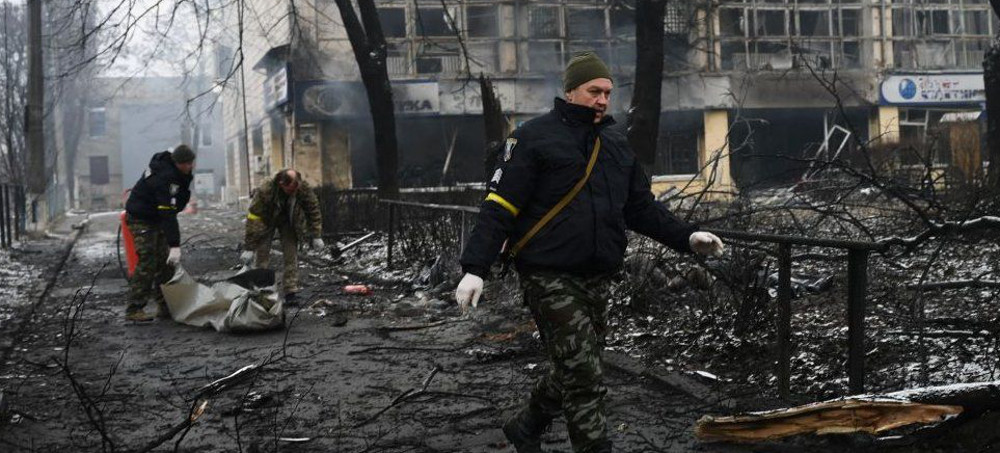 Emergency services in the aftermath of a strike on a TV tower in Kyiv on Tuesday that killed five. (photo: Getty)
Emergency services in the aftermath of a strike on a TV tower in Kyiv on Tuesday that killed five. (photo: Getty)
As Russia's invasion of Ukraine enters its second week, the port city is seeing some of the fiercest fighting with constant shelling for the past 24 hours, Mayor Vadym Boichenko said in a video broadcast. read more
The city authorities likened the Russian onslaught to Nazi Germany's protracted deadly siege of the then-Soviet city of Leningrad during World War Two.
"Mariupol remains under fire. Women, children and the elderly are suffering. We are being destroyed as a nation. This is genocide of the Ukrainian people," the city's council said in a statement.
Relatives of people still in the city told Reuters they had not heard from their loved-ones due to the power outage and were desperate for news.
"They are now in the very centre of hostilities and I am far from them and cannot help," said 30-year-old driver Dmitriy, who had travelled abroad for work just before war broke out, leaving his wife and young son in Mariupol.
"I've not been able to reach them for around 24 hours," he said by message. "We all lived a peaceful life, working, studying, making plans, until life turned completely upside down."
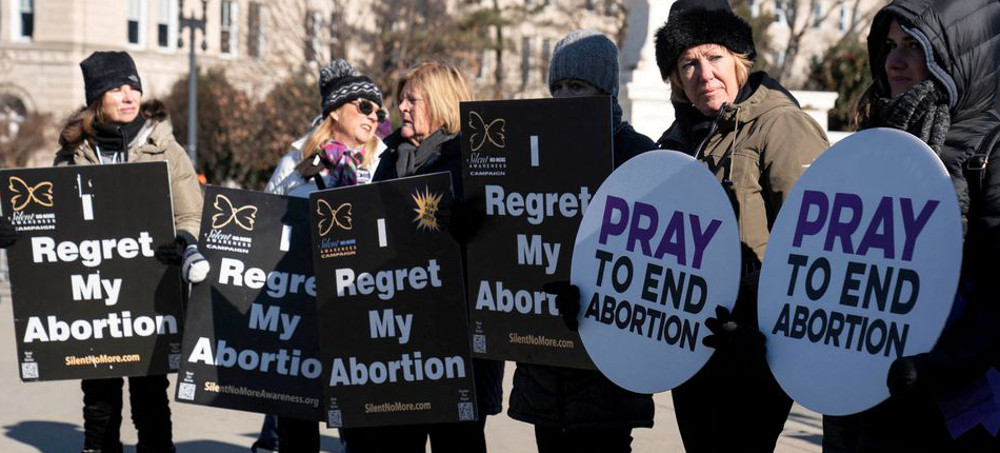 Activists participate in a demonstration against abortion rights on the anniversary of the Roe v. Wade decision at the U.S. Supreme Court in Washington, U.S., January 22, 2022. (photo: Sarah Silbiger/Reuters)
Activists participate in a demonstration against abortion rights on the anniversary of the Roe v. Wade decision at the U.S. Supreme Court in Washington, U.S., January 22, 2022. (photo: Sarah Silbiger/Reuters)
ALSO SEE: Idaho Senate Approves Republican Bill
to Ban Abortion After Six Weeks
The state's House of Representatives, which also has a Republican majority, approved the measure last month on a party-line vote.
Final legislative passage on a 23-15 vote in the Senate sent the bill to Governor Ron DeSantis, a Republican, who is expected to sign the measure into law.
"Governor DeSantis is pro-life and has voiced support for the concepts in this bill," his spokesperson, Christina Pushaw, said earlier in the day.
Enactment of the bill would significantly reduce access to late-term abortions for women across the U.S. Southeast, many of whom travel hundreds of miles to end pregnancies in Florida because of stricter abortion laws in surrounding states.
The state currently permits abortions within up to 24 weeks of pregnancy without a mandatory waiting period, meaning a woman can terminate her pregnancy the day she arrives at a clinic.
Florida's measure, which would take effect on July 1, makes exceptions to the 15-week restriction only in cases when the mother is at risk of death or "irreversible physical impairment," or if the fetus has a fatal abnormality.
In a session on Wednesday, Republicans defeated an amendment that would have made exceptions for rape, incest and human trafficking.
Democratic lawmakers who supported the amendment asked their colleagues to focus on the emotional needs of pregnant victims of sexual assault. "We're better than this," state Senator Victor Torres said.
The bill's sponsor, state Senator Kelli Stargel, defended the bill's exclusion of an exception for rape, saying she rejected the premise that a "child should be killed because of the circumstances in which it was conceived."
Republican lawmakers around the country have introduced bills mirroring a 15-week abortion ban enacted by Mississippi and now being weighed by the U.S. Supreme Court after lower courts blocked the measure as unconstitutional. Arizona's Senate and West Virginia's House passed similar 15-week abortion bans last month.
Some states have also sought to craft their own versions of a Texas law that bans abortion at six weeks and empowers citizens to sue people who assist women getting abortions past that point. Idaho's state Senate passed a Texas-style six-week abortion ban on Thursday, sending it next to the state House for approval.
During oral arguments in December, the Supreme Court indicated its willingness to allow Mississippi's 15-week abortion ban to stand. A ruling in Mississippi's favor would conflict with the landmark 1973 Roe v. Wade decision establishing the right to end a pregnancy before the fetus is viable, typically around 24 weeks.
Besides seeking reinstatement of its abortion law, the state of Mississippi in Jackson Women's Health Organization v. Dobbs has asked the high court to overturn Roe altogether.
The Supreme Court's ruling is expected this spring.
The American Civil Liberties Union (ACLU) of Florida said a privacy clause in Florida's constitution that explicitly protects against government "intrusion" in residents' private lives would be grounds for a lawsuit challenging a 15-week abortion ban.
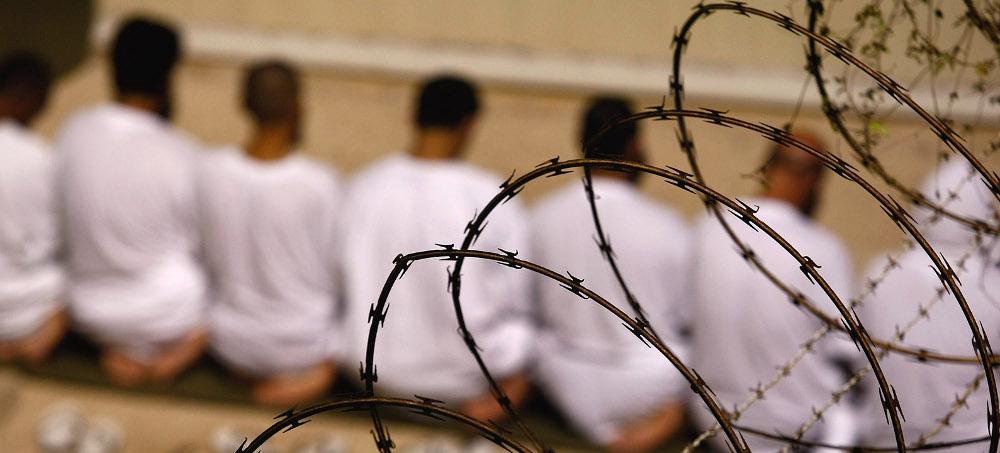 A group of detainees kneeling in prayer in the U.S. prison camp at Guantánamo Bay, Cuba, October 28, 2009. (photo: John Moore/Getty)
A group of detainees kneeling in prayer in the U.S. prison camp at Guantánamo Bay, Cuba, October 28, 2009. (photo: John Moore/Getty)
Abu Zubaydah was the first prisoner held by the CIA to undergo what, at the time, was euphemistically called "enhanced interrogation." During one 20-day period, he was waterboarded 83 times, 24 hours a day. During that period, the suspected terrorist was also slammed against walls, put in a coffin-like box for hours at a time to simulate live burial, and subjected to something the government called "rectal rehydration."
In the end, the two CIA contractors who supervised Zubaydah's interrogation concluded that they had the wrong man. He was not a high-level al-Qaida operative, as the CIA had thought.
Disclosures about the torture
All of this has been publicly documented by a lengthy Senate Intelligence Committee report, the European Court of Human Rights, widespread press reports and disclosures by the two CIA contractors who supervised his torture. In fact, the CIA did allow the now-former contractors to write and speak extensively — and even testify in limited circumstances — about the "enhanced interrogation" program.
But when lawyers for Zubaydah subpoenaed them, the U.S. government blocked the move by invoking the so-called "state secrets" privilege, a doctrine created by the Supreme Court in 1953 that allows the government to shield evidence harmful to national security.
In this case, both the Trump and Biden administrations argued that even though the information about the torture program is widely known, confirming the existence of CIA black sites in Poland would jeopardize the U.S. government's relationship with foreign intelligence services.
A fractured opinion
On Thursday, the Supreme Court ruled in favor of the government, in a very fractured opinion. The vote was 7-to-2, but with four separate opinions on the majority side and a furious dissent. Justice Stephen Breyer wrote the majority decision, setting out narrow grounds for siding with the government. But, he added, "we do not decide here whether a different ... request filed by Zubaydah might" avoid the pitfalls of this particular case. Indeed, at oral argument, the government refused to say whether it would allow Zubaydah, now detained at Guantanamo Bay, to testify himself about his interrogation.
Only Chief Justice John Roberts joined Breyer's opinion in its entirely. Justice Clarence Thomas agreed only on the end result and refuted the idea that judges should play any role in reviewing secret material. Justices Brett Kavanaugh and Amy Coney Barrett also filed a separate concurring opinion. And Justice Elena Kagan wrote that while she largely agreed with Breyer's analysis, she would not have dismissed the case, but would have allowed the lower court to see if there were other ways of avoiding disclosure of secret material.
Justice Neil Gorsuch, in an angry dissent joined by liberal Justice Sonia Sotomayor, emphasized a long history of the government invoking national security to "shroud major abuses." Here, the government really wants to "avoid further embarrassment for past misdeeds," Gorsuch concluded. "But as embarrassing as these facts may be, there is no state secret here. This court's duty is to the rule of law and the search for truth. We should not let shame obscure our vision."
'No accountability for the U.S. program'
Joseph Margulies, Zubaydah's lawyer, sought to put the best gloss on Thursday's decision. "We are pleased the Supreme Court confirmed that the United States Government tortured Abu Zubaydah," he said in an email to NPR. He said that even with Thursday's opinion, he believes that there remains a pathway "to finally uncover the truth."
Josh Colangelo-Bryan, a lawyer who represents other Guantanamo Bay detainees, was more critical. "The opinion also is an excellent reminder that there has been no accountability for the U.S. program that subjected people to torture, something particularly worth remembering while the U.S. rightly condemns Russia for violating international law next door in Ukraine," he said in a statement.
The man at the center of Thursday's case, Abu Zabaydah, has been in custody now for nearly 20 years. Since 2006, he has been at the U.S. base at Guantanamo Bay in Cuba and remains there despite having been cleared for release.
There are just 39 prisoners left at Guantanamo, where the price tag is $13 million a year for each prisoner. Twenty have been cleared for release, 12 have been charged in 9/11-related cases and the remainder have not been charged but are considered too dangerous to release.
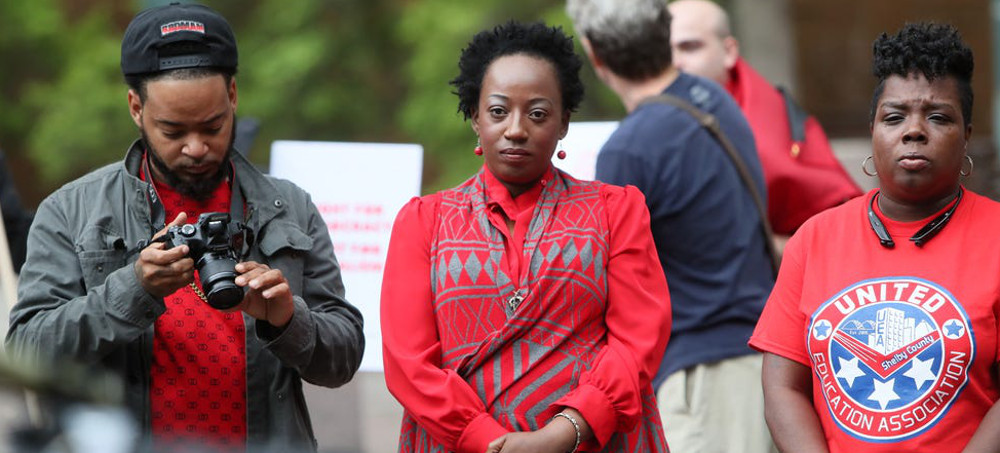 Pamela Moses attends a May Day gathering outside City hall in Memphis. (photo: Joe Rondone/The Commercial Appeal)
Pamela Moses attends a May Day gathering outside City hall in Memphis. (photo: Joe Rondone/The Commercial Appeal)
In several prominent cases, Black people got harsher sentences for unintentional voting errors than whites who committed fraud
A few months later, Bartman, who is white, requested a mail-in ballot for his late mother and cast her vote for Donald Trump. Bartman was arrested that December and charged with perjury and unlawful voting. Months later, he pleaded guilty, admitted he made a “stupid mistake”, was sentenced to five years of probation and barred from serving on a jury or voting for four years.
“There’s not public benefit to him being incarcerated,” Jack Stollsteimer, the local district attorney said at the time. “This defendant from the beginning has accepted responsibility for his actions, and he has paid the price for them.”
When Bartman pleaded guilty, nearly 1,000 miles away, in Memphis, a Black Lives Matter activist named Pamela Moses was facing her own election-related criminal charges. A few years previously, Moses, who is Black, permanently lost the right to vote after committing a felony. But no one had actually removed Moses from the voter rolls or told her she couldn’t vote. And in 2019, when state officials began looking into her eligibility, a probation officer signed a certificate saying Moses had completed her sentence and was eligible to vote. So she applied to do so. Even though corrections officials conceded they made an error, Moses was indicted anyway.
Moses was convicted by a jury in November. In late January, she was sentenced to six years and one day in prison
Her sentence attracted widespread national scrutiny for its harshness – it is among the most severe for an election-related crime issued in recent memory. Following weeks of outcry and the introduction of new evidence revealed by the Guardian, a judge ordered a new trial for Moses last week.
Despite that unusual reversal, the case also underscored what many experts see as a double standard in the US criminal justice system: white people face relatively light punishment for intentional cases of fraud, while Black people face tougher punishments for unintentional voting errors.
No comprehensive data exists comparing voter fraud prosecutions based on race. It’s also difficult to compare prosecutions in different jurisdictions because a criminal sentence depends on many factors, including the discretion of the local prosecutor, state laws, the facts of the offense, and the defendant’s criminal history. But the experts say the cases that have come to prominence ring alarm bells.
“This [Moses] conviction has resonated across the country, the world, and it certainly has resonated in this community. I would suggest that it certainly resonated with Black women who might wonder if they’re eligible to vote in the coming elections,” said Josh Spickler, the executive director of Just City, a criminal justice non-profit in Memphis. “It is what you think it is. It is voter suppression. It is a message to consider whether you should vote or not.”
Moses’ case immediately attracted comparisons to the case of Crystal Mason, a Texas woman who was sentenced to five years in prison for voting while on federal supervised release – similar to probation – in 2016. Probation officials testified that they never told Mason she couldn’t vote, and her ballot was never counted, but a judge found her guilty of illegally voting anyway. An appeal is currently pending at Texas’s highest criminal court.
Last summer, Texas officials also arrested Hervis Rogers, who is Black, for voting while on probation for a felony. Rogers, who received national attention after waiting seven hours in line to vote in 2020, also says didn’t know he was ineligible. His case is currently pending and he could face years in prison.
“What we do see is that there’s a willingness to go after people who are making, at worst, innocent mistakes. That’s not what our justice system should be about,” said Thomas Buser-Clancy, a lawyer with the Texas chapter of the American Civil Liberties Union who is helping represent both Mason and Rogers.
These relatively long sentences stand out even more given several recent examples in which white defendants who committed acts of fraud received no prison time at all.
Last year, a 72-year old Republican voter in Pennsylvania was sentenced to probation after putting on sunglasses and trying to impersonate his son at the polls. In Arizona, a 64-year-old woman pleaded guilty to forging her deceased mother’s signature on a mail-in ballot; she was sentenced to probation and could face up to 90 days in jail when she is sentenced in March. In Nevada, a Republican who voted using his dead wife’s ballot and then lied about it pleaded guilty and was sentenced to probation.
And in 2018, about a month after Mason was sentenced, a white justice of the peace in the same county pleaded guilty to forging signatures to get on the ballot when he was running for office. He was sentenced to probation.
“You have Ms Mason’s case of what at worst is an innocent mistake … on the other hand you have someone who intentionally – you can’t innocently forge signatures, and they received probation,” said Buser-Clancy. “It’s the same county, same DA, very different results, when you would expect it to go the opposite way.”
In Texas, the prosecutor who handled Mason’s case defended the harsh sentence by noting that she offered her a plea deal with probation. “Our office offered Mason the option of probation in this case, which she refused. She chose to have a trial by judge, and the judge found beyond a reasonable doubt from the evidence that she knew she wasn’t eligible to vote and voted anyway,” she said in 2019.
Amy Weirich, the district attorney in Memphis who prosecuted Moses, also defended her handling of the case in part by noting that she offered Moses a plea deal that did not involve incarceration.
“I gave her a chance to plead to a misdemeanor with no prison time,” Weirich said in a statement. “She requested a jury trial instead. She set this unfortunate result in motion and a jury of her peers heard the evidence and convicted her.”
“It’s a fact for various reasons that people who go to trial generally get harsher sentences,” said Daniel Richman, a law professor at Columbia University who has written extensively about prosecutors. “Sometimes you hear arguments, and there’s some substance to them, that the prosecution is seeking to punish the defendant for going to trial, and I’m sure that happens. But another thing that always happens is the judge knows the case a lot better. And generally, when a judge knows a case a lot better, the defendant is worse off.”
But the decision to reject a plea and go to trial, a constitutional right in the US, shouldn’t necessarily lead to a harsher sentence, experts say. For someone who already has a criminal record like Mason or Moses, accepting a plea deal for a new crime can have severe consequences, such as the revocation of probation or losing a job.
“Why is it we have a system where a prosecutor can basically say to somebody, you plead, we’ll extend your probation. If you don’t plead, you’re facing six years. Does that sound like the kind of system we want?” said Bennett Capers, a former federal prosecutor who now teaches law at Fordham University. “If [Moses] had taken the plea, nobody would have known about this case.”
Prosecutors have also defended the sentences for Moses and Mason by pointing to their prior criminal records. But in the US, having a criminal conviction means navigating an enormously confusing set of rules in order to regain one’s vote, and such rules vary widely by state. Those confusing voting rules are more likely to affect Black Americans like Moses and Mason.
Over one-fifth of Black people of voting age in Moses’ home state of Tennessee – nearly 175,000 people – can’t vote because of a felony conviction, according to an estimate by The Sentencing Project, a criminal justice non-profit. There is a stark racial disparity. Around 17% of Tennessee’s population is Black, but Black people account for around 40% of those disenfranchised because of a felony conviction in the state. Nationally, around 2.3% of the voting age population can’t vote because of a felony conviction. But it is 6.3% of Black Americans of voting age.
“This is much more likely to have a disparate effect on people who are Black and brown. People who are Black and Brown are more likely to have a conviction,” Capers said.
The Moses case “sort of sends a message that ‘you know, by the way, don’t think about going to the polls’”, Capers said.
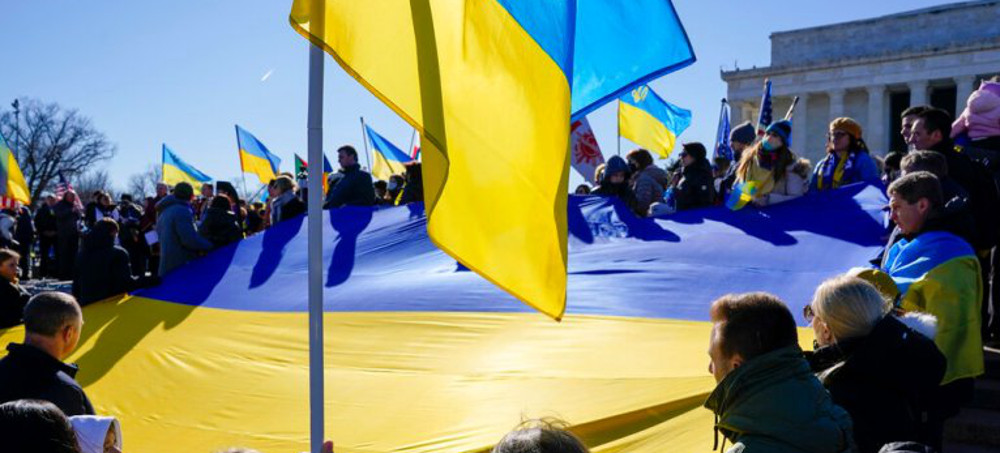 'In these extraordinary times, we will continue to offer our support and protection to Ukrainian nationals in the United States,' DHS Secretary Alejandro Mayorkas says. (photo: Patrick Semansky/AP)
'In these extraordinary times, we will continue to offer our support and protection to Ukrainian nationals in the United States,' DHS Secretary Alejandro Mayorkas says. (photo: Patrick Semansky/AP)
Department of Homeland Security grants temporary protected status to Ukrainian citizens amid Russia-Ukraine war.
The US Department of Homeland Security (DHS) said on Thursday that it was extending temporary protected status (TPS) to Ukrainians for 18 months because of the “ongoing armed conflict and extraordinary and temporary conditions” in the country.
The decision comes after immigration advocates and US legislators called on President Joe Biden to protect Ukrainians who are in the US on a temporary basis, such as students and visitors.
“Russia’s premeditated and unprovoked attack on Ukraine has resulted in an ongoing war, senseless violence, and Ukrainians forced to seek refuge in other countries,” DHS Secretary Alejandro Mayorkas said in a statement announcing the decision.
“In these extraordinary times, we will continue to offer our support and protection to Ukrainian nationals in the United States.”
Senate Majority Leader Chuck Schumer welcomed the announcement, saying he had been pushing for the TPS designation. “The United States stands with the people of Ukraine,” the senator wrote on Twitter.
Earlier this week, more than 40 members of the US House of Representatives also signed a letter urging Biden to designate Ukraine for TPS.
Democratic Congressman Jamie Raskin, one of the letter’s signatories, lauded the TPS designation on Thursday. “It is a privilege to support Ukrainians here as they defend democracy against fascist aggression,” he tweeted.
Russia launched an all-out invasion on Ukraine last week, which DHS described on Thursday as “the largest conventional military action in Europe since World War II”.
The department said Ukrainians who have been in the US as recently as March 1 will be eligible for protection. The designation also allows Ukrainians to apply for work permits.
As the war entered its eighth day on Thursday, Russian forces captured the strategic southern port city of Kherson and encircled Mariupol to the east as they pushed to capture urban centres across the country, including the capital Kyiv.
The fighting has pushed one million Ukrainians to flee the country in search of safety so far, according to the United Nations.
The conflict has spurred the US and its allies to issue significant sanctions against Russian banks and industries.
Earlier on Thursday, the Biden administration announced new sanctions targeting wealthy elites in Russian President Vladimir Putin’s inner circle, as well as Kremlin Press Secretary Dmitry Peskov.
“In the State of the Union address, I announced that the Department of Justice is going after the crimes of Russian oligarchs … who line their pockets with Russian peoples’ money while [the Ukrainian people] are hiding in the subway from Russian missiles that are being fired indiscriminately,” Biden said ahead of a cabinet meeting.
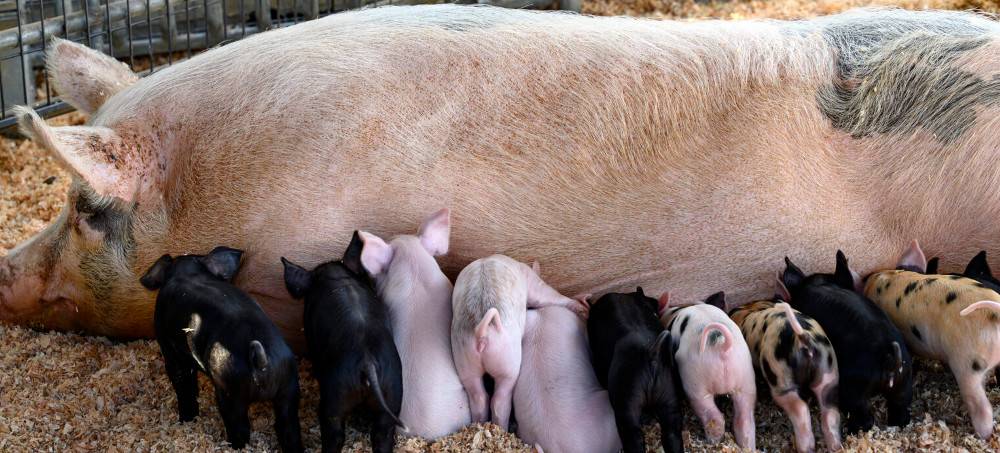 In Cost Mesa, California, piglets and their mother in January. (photo: Mindy Schauer/Getty)
In Cost Mesa, California, piglets and their mother in January. (photo: Mindy Schauer/Getty)
Proposition 12 bans “gestation crates” for pregnant sows and requires that all eggs be cage-free.
California’s Prevention of Cruelty to Farm Animals Act, also known as Proposition 12, sets the strictest minimum confinement standards in the nation to ensure the humane treatment of farm animals.
After the law’s final requirements went into effect on Jan. 1, a Superior Court judge in Sacramento delayed enforcement of one provision, that gestating sows be confined in no less than 24 square feet of space. That requirement now won’t be enforced for 180 days, following the issuance of final regulations by the California Department of Food and Agriculture (CDFA).
The National Pork Producers Council and the American Farm Bureau Federation, meanwhile, are asking the U.S. Supreme Court to find the law unconstitutional, on grounds that it violates the Commerce Clause by subjecting out-of-state farms, where most of California’s pork comes from, to California regulations.
A similar petition filed by the North American Meat Institute was rejected last summer.
California voters approved Proposition 2 in 2008, banning several forms of animal confinement on California farms. Proposition 12, passed in 2018 with almost two-thirds of the vote, amended and expanded the earlier law, prohibiting the sale of uncooked meat products in California—no matter their state of origin—from animals “wrongly confined.”
The first provisions of Proposition 12 went into effect in 2020, setting standards for the minimum amount of space required for egg-laying hens and calves raised for veal. This year’s deadline set the now-delayed minimum space standards for breeding pigs and also banned gestation crates, which are too small to allow pregnant pigs any room to move. The new standards go a step further for hens, requiring that all eggs sold in the state must be from cage-free birds.
The law has set off a flurry of legal challenges and fierce debate between animal rights advocates, who see it as a major victory against cruel treatment of farm animals, and trade groups, which claim that Proposition 12 puts a burden on consumers, out-of-state producers and small farms.
“Ordinary Americans already know this is wrong,” Josh Balk, vice president of farm animal protection at the Humane Society, said of the practices now banned. “These laws are the most common-sense laws you can imagine.”
Of particular concern to Balk was the use of gestation crates, pens so small that pregnant pigs are unable to stand up or turn around in them.
“It’s basically her being forced to live in her own coffin,” said Balk, referring to the female pigs.
In addition to animal rights, proponents of the law argue that its provisions improve food safety. A 2020 report by the United Nations found that factory farming and intensive confinement of livestock have increased the risk of animal-based disease outbreaks. From the farmer’s perspective, research has also shown that not using gestation crates is “more economical,” leading to healthier and more valuable piglets.
Most egg producers, facing the new cage-free requirements at the beginning of the year, have quietly complied.
“Our members intend to comply with all new state laws governing hen housing as they are implemented,” a representative of United Egg Producers, the largest egg producer association in the country, said in a written statement.
Critics of the law from the meat industry, meanwhile, point to the California department of agriculture’s own assessment that the proposed regulations could increase prices for California consumers.
The department also found that costs to provide free and reduced-price school meals were expected to increase by almost $2 million next year, while meal costs for state prisons could increase by over $4 million per year. CDFA has also recognized that California-based farms may struggle to compete when selling products outside of California against out-of-state producers not held to the same standards.
Jen Sorenson, president of the National Pork Producers Council, has written that the law was “flawed from the start” and that it undermined the food security of the whole nation.
Trade groups have also questioned the constitutionality of California setting laws that apply to out-of-state producers.
“For every pig raised in California, 235 are raised in Iowa,” wrote Sen. Grassley in an op-ed last month in The Des Moines Register. “I’m baffled that the Golden State should have any say in how Iowa hog producers raise pigs.”
The North American Meat Institute and the American Farm Bureau Federation, jointly with the National Pork Producers Council, have filed lawsuits against Proposition 12 with the support of several states, mostly in the Midwest. The United States Court of Appeals for the Ninth Circuit rejected both lawsuits, pushing the plaintiffs to petition the Supreme Court.
The Jan. 25 Superior Court ruling in Sacramento, delaying enforcement of the confinement provision for sows, was in response to a separate lawsuit, brought by restaurant and grocery business groups frustrated by the lack of official guidance for Proposition 12 implementation.
While the ballot initiative required CDFA to publish regulations for implementing the law by late 2019, the agency has yet to finalize rules as to how the law will be enforced and how Proposition 12-compliant products will be certified and labeled. The agency reopened its public comment window briefly in December, so final regulations could be months away.
Plaintiffs in the case have written that the regulatory delay “places pork suppliers in an untenable position” and that small businesses and consumers will “pay the price of this uncertainty.”
Much of the debate, though, revolves around disagreements as to how the new requirements will affect small farms.
“Small farms across the country will be forced to make expensive and unnecessary changes to their operations, which will lead to more consolidation and higher food prices,” Zippy Duvall, president of the American Farm Bureau Federation, said in a written statement.
CDFA, however, argues that small, non-industrial farming operations are more likely to be compliant with the law already.
Chris Oliviero, general manager of Niman Ranch, a specialty meat company based in Colorado, said he also finds arguments focused on small farms disingenuous. He said that in many agricultural states, the number of independent hog farmers has declined in recent years, even as the number of pigs has grown.
“This narrative that the conventional system that’s out there is a great fit for the majority of farmers is a false argument,” he said.
In fact, opening up space in the California market for producers willing to be Proposition 12-compliant may create new opportunities for independent farmers, Oliviero said.
Niman Ranch, which represents 750 family meat farms nationally, was the first brand to support Proposition 12 in court, filing a brief to counter a lawsuit brought by Iowa pork producers.
“For Niman, supporting Prop 12 was really easy,” said Oliviero. “We don’t believe there’s anything humane about keeping a sow in a seven-foot-by-two-foot crate.”
According to Oliviero, Niman’s vocal support of Proposition 12 is also meant to counter the narrative pushed by trade groups that their opposition reflects the feelings of all pork producers. If anything, he said, it’s drawn attention to the problematic practices of the hog industry. For Niman, being “out front” with Proposition 12 is just good business.
“I understand the concern,” Oliviero said, of the challenges pork farmers face having to make significant changes to their operations because of Proposition 12. “But the industry has proven time and time again that, when they put their minds to it, they’re more than capable of making big changes.”
Follow us on facebook and twitter!
PO Box 2043 / Citrus Heights, CA 95611

